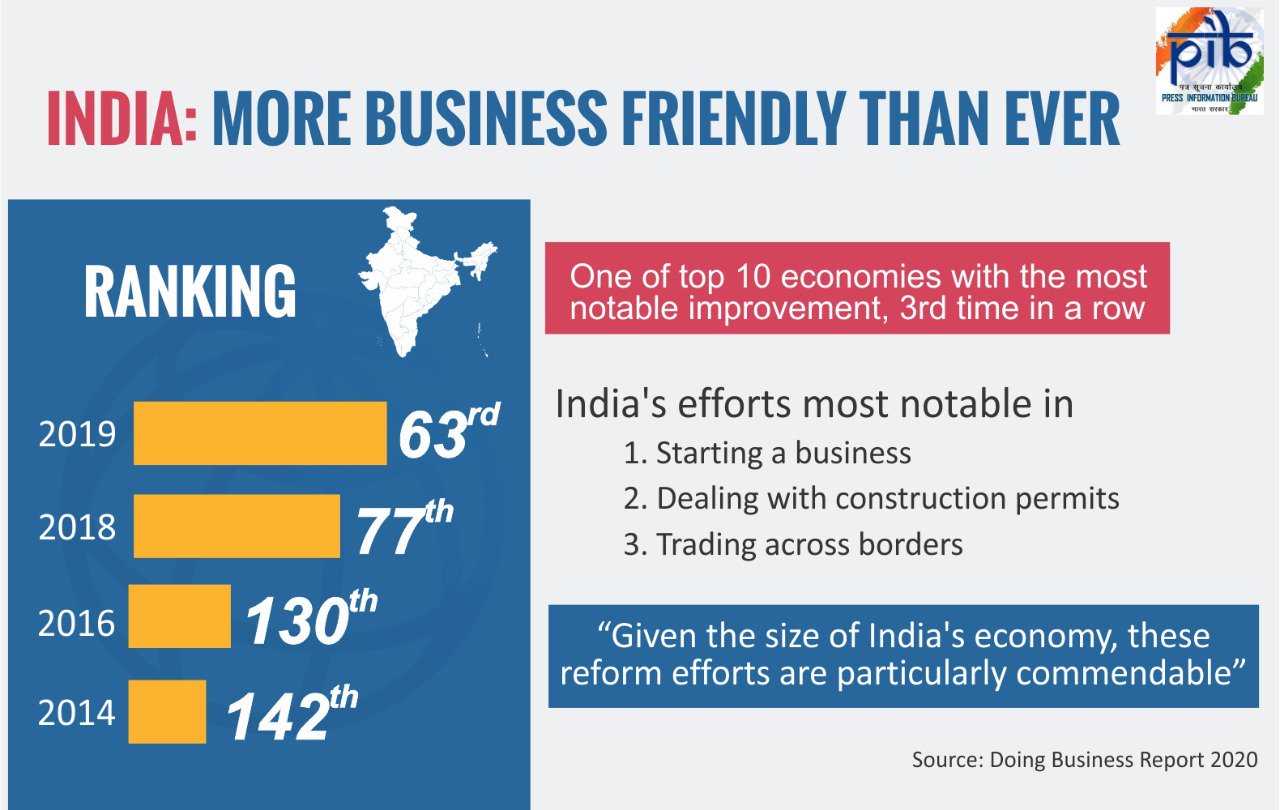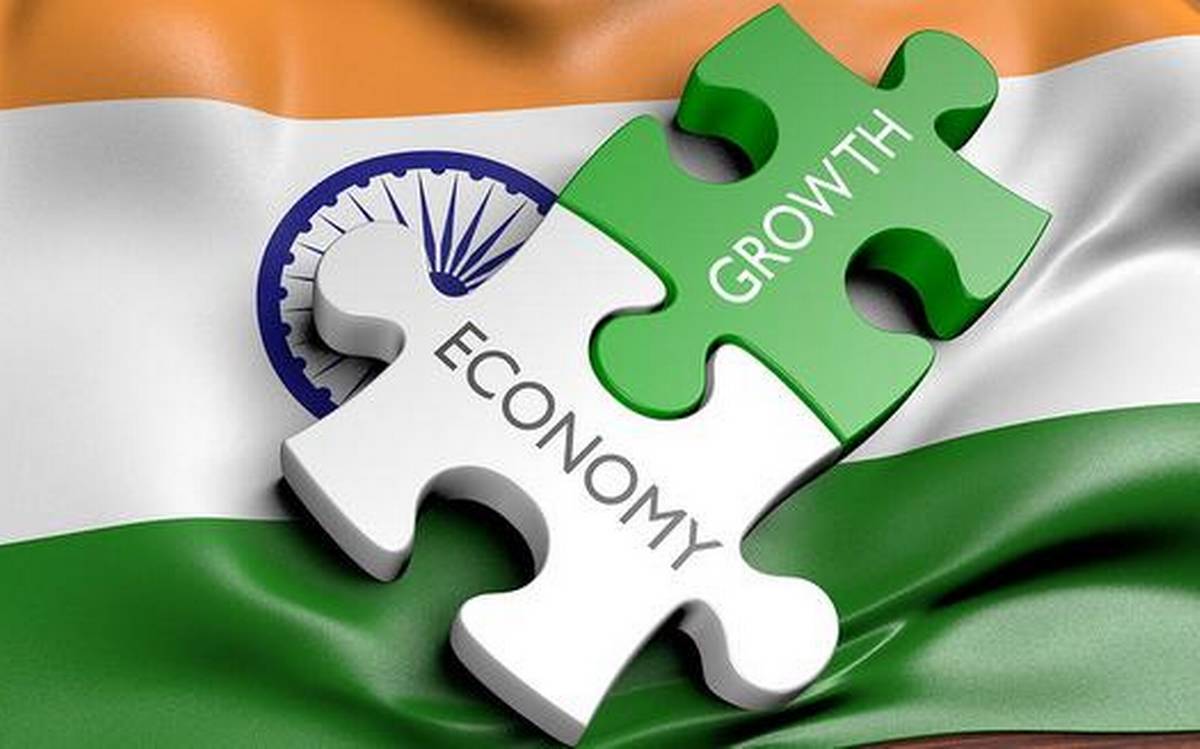Ease of Doing Business Index (EoDB): India's 63rd position signals an investment friendly business climate

“Ease of Doing Business is one method for assessing the quality and efficiency of regulatory practises. It assesses the procedures for starting a business, obtaining a building permit, obtaining an electricity connection, relocating property, obtaining credit, protecting minority investors, paying taxes, engaging in international trade, imposing contracts, and resolving bankruptcy (The World Bank Group, 2019). Earlier studies on market regulation concentrated on its effect on foreign direct investment and the economy, or evaluated it as a method for deciding where to invest.”
The History of the Ease of Doing Business Ranking
- The World Bank Group's Doing Business Survey is based on various government regulations that act as impediments to starting and operating a business in the country.
- For several years, the World Bank has published the ‘Ease of Doing Business Report.' In September 2003, the first report was completed.
- The first Ease of Doing Business Ranking report included 145 economies, which has since grown to 190 economies worldwide in 2018.
- To calculate the rankings, more aspects that are important to the daily operations of domestic small and medium-sized businesses have been added.
- The importance of the private sector in determining rankings is acknowledged, as it accounts for approximately 90% of jobs in developed economies.
What criteria are used to determine the Doing Business rankings? The Most Important Parameters
- The Doing Business Ranking assesses various aspects of business regulation and their consequences for the formation and activity of businesses.
- It does not address all of the topics that affect business decisions, but it does cover key areas that policymakers have influence over.
- Governments all over the world understand the economic and political advantages of better business regulation.
- In the 2016/17 fiscal year, 119 of the 190 economies tracked by Doing Business 2018 passed at least one business regulation reform. For the second year in a row, 79.8% of these adopted at least one reform, and 64.7 percent for the third year in a row.
- Starting a company, getting a place, accessing financing, dealing with day-to-day operations, and operating in a safe business environment are the eleven criteria that formed the basis of the Ease of Doing Business Ranking 2018.
- Starting a Company, Labour Market Regulation, Dealing with Building Permits, Getting Electricity, Registering Land, Getting Credit, Protecting Minority Investors, Trading Across Borders, Paying Taxes, Enforcing Contracts, and Resolving Insolvency are the 11 ranking criteria.
The 10 economies improving the most as per the last survey
India's Positions in the Rankings
India rose from 132nd place in the Doing Business Ranking in 2008 to 77th place in 2018 and 63rd place in 2019.
Improved Rankings: A Boost for India's Business Environment
- The rise in the Doing Business Ranking reflects the efficacy and efficiency of business regulation.
- The economic importance of the dimensions of market regulation assessed by Doing Business is supported by research findings. For example, recent research has looked into the effects of bettering business regulation. According to one report, high start-up costs can lead to lower overall productivity.
- Improving the country's Ease of Doing Business ranking would improve the country's reputation and draw more foreign investment.
- The improved ranking would encourage more entrepreneurs to start businesses, resulting in more ventures in the ‘Start Up India' and ‘Make in India' categories.
- The Doing Business Ranking focuses on improving key areas of government-entrepreneur engagement where policymakers and regulators can directly influence procedures to promote these interactions.
Even the International Monetary Fund, which had been bullish on India's economic prospects, has lowered its projections, though it still expects India's GDP to grow. The unemployment rate in India, at 6.1 percent, was the highest in the last 45 years, according to a National Sample Survey Organization (NSSO) report withheld prior to the last general elections. According to media leaks, the NSSO consumer spending data for 2017-18 shows a decrease in average monthly consumer expenditure, implying that poverty has risen since the current government took power.
If true, this will mean that India's poverty rate, which had been steadily decreasing since 1991, has now reversed.
Just up to 2012 is the most recent available poverty data based on NSS consumer spending data. Statistical reports and data on various industries, which were formerly routinely published to the public during the last 70 years, are now being withheld or managed to conceal the truth of the economy's condition.
MSMEs are ignored
MSME went unnoticed. Micro, small, and medium enterprises (MSME) account for 45 percent of total industrial jobs, 50 percent of total exports, and 95 percent of all industrial units in the country, according to the study.
It also overlooks the unorganised market. The study is primarily focused on a review of each country's laws and regulations, as well as information gathered from a survey of private sector professionals, mostly lawyers, and government officials.
Surprisingly, the study excludes company owners, who are in the best position to report on the ease of doing business. There's also no detail on how these people were chosen. Officials from the government can only pardon. Government officials can only repeat what the current regime wishes to hear.
The vast chasm that exists between regulations and their actual implementation is well known among Indians. While India has improved in four indicators, including starting a company, dealing with construction permits, trading across borders, and resolving insolvency, there has been no improvement in six others, including getting electricity, credit, registering land, protecting minority investors, paying taxes, and enforcing contracts.
The report's overall ease of doing business index is just a simple average of the scores for the ten metrics, which is dubious because it gives equal weight to all of them.
The report's overall ease of doing business index is just a simple average of the scores for the ten metrics, which is questionable because it gives equal weight to all of them. The sad storey of an NRI businessman in Kerala who committed suicide recently because of years of delays in getting clearances from the local panchayat for his company is perhaps the most poignant depiction of the real state of ease of doing business in India.
Holding door for new Opportunities
A favourable business environment is a requirement for a country's growth. India, as one of the world's fastest developing countries, has the potential to exceed the world's leading economies in terms of business. The government's Make in India initiative, which was launched in 2014 with the aim of transforming India into a manufacturing hub, has focused its efforts on making it easier to do business in India by attracting more domestic and international companies to invest and do business in the country, which will boost FDI and be critical in the country's upgrading the whole economy.
India, one of the fastest improving nations, has improved dramatically in recent years, but there is still more work to be done.
It has enacted significant changes that make it easier and quicker for entrepreneurs to start and run their small and medium-sized businesses. The following are some of the ways India can boost its ease of doing business ranking:
- Implementing e-governance would result in the completion of procedures electronically, avoiding the need to meet with government officials and lowering the risk of bribery.
- There are a variety of forums for gathering input from users who have been affected by the regulatory measures that have been introduced. This information can be useful in determining what users think and what adjustments need to be made.
- It is critical to expedite the processing of construction permits, for which a dedicated manufacturing zone should be created. As well as having their own political council to collaborate with other government bodies, the central business district has their own government body.
- The time it takes to import and export goods has a significant impact on cross-border trade. The problem can be solved by reducing the amount of paper work and improve port facilities to reduce the time it takes to move goods in and out of the country
India was ranked 130th in 2016, which drew a lot of criticism for the government's policies because it was lagging behind its BRICS counterparts in the rankings. India has improved 30 ranks in a year as a result of the government's policies launched under the Make in India campaign, which aims to create more than 100 million jobs by 2022, make India a manufacturing hub, and increase the manufacturing sector's contribution to GDP to 25%. India's expectations are strong that, with the government's support, it will be able to break into the top 50 countries for ease of doing business.
While numerous steps have been taken to boost rankings, the effect of GST will be factored into the 2018 ranking, which will further improve India's ranking. The government should focus more on weak areas such as starting a company, dealing with construction permits, trading across borders, and registering property. These are some indicators that need special attention because they are the main reason India is lagging behind in the world bank ranking. It is critical to ensure that this is not just one department's responsibility, but that it is shared by all. To increase its ranking, India needs to run faster. India can achieve its goal of ranking in the top 50 countries for ease of doing business through sheer hard work and perseverance.








